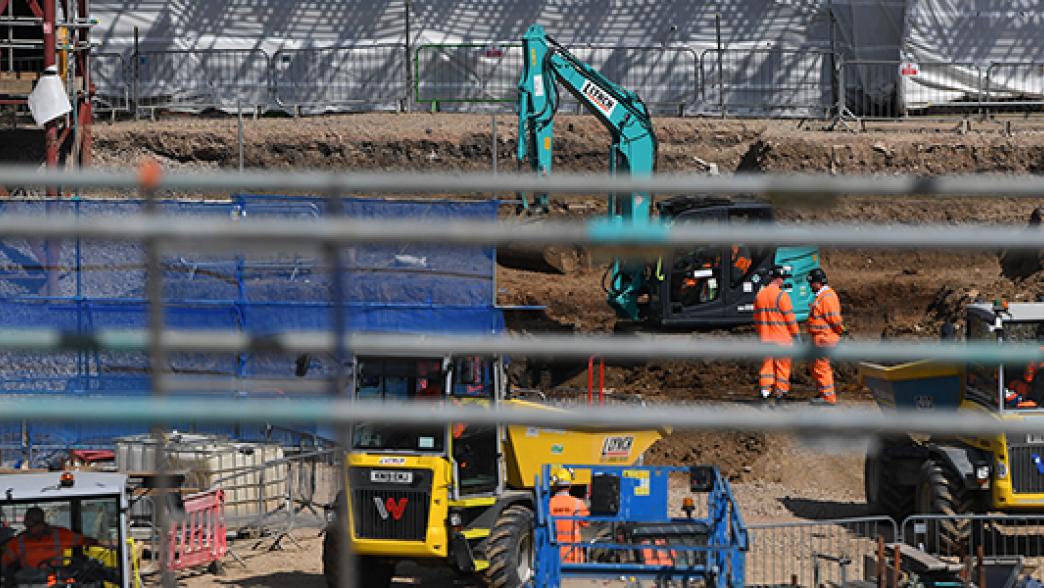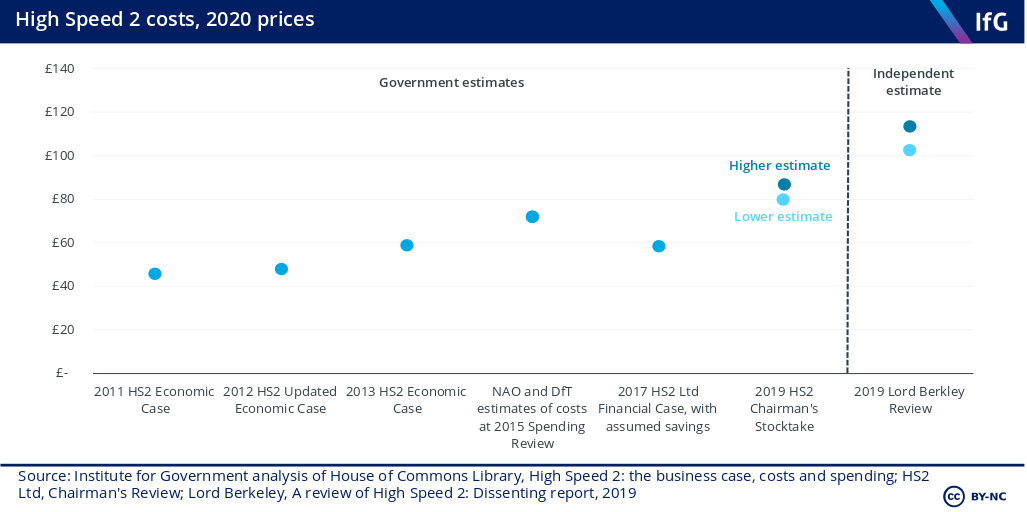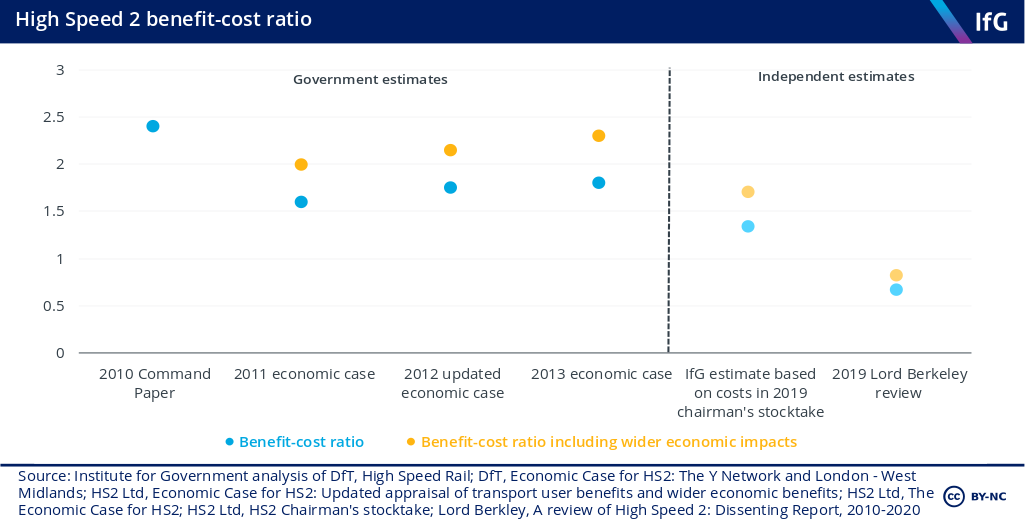High Speed 2 costs
High Speed 2 (HS2) is a proposal to build a high-speed rail line in two parts – ‘Phase 1’ between London and Birmingham, and then ‘Phase 2’ between Bi

What is High Speed 2?
High Speed 2 (HS2) is a proposal to build a high-speed rail line in two parts – ‘Phase 1’ between London and Birmingham, and then ‘Phase 2’ between Birmingham and Crewe, and Birmingham and Manchester and Leeds.
How much will High Speed 2 cost?
Government estimates
The government initially estimated that HS2 would cost £37.5bn in 2009 prices. The latest estimate from HS2 Ltd – the non-departmental public body responsible for building the line – found that the cost of HS2 is likely to be between £72.1bn and £78.4bn in 2015 prices. The cost of HS2 has increased in real terms, faster than increases in economy-wide prices.

Between 2011 and 2013, the cost of HS2 rose by £12.6bn in cash-terms. The 2013 cost estimate included £7.5bn for rolling stock (trains) that had not been included previously. Excluding the trains, the remaining costs of building the line rose by around £5.1bn. All cost estimates after 2013 include trains, so the cost of HS2 – including trains in earlier estimates – rose by around 46% in real terms between estimates in 2011 and 2019.
HS2 Ltd projected that the cost would fall between 2015 and 2017 because they assumed that they would be able to make efficiencies – reducing the costs of property acquisition, getting contractors to deliver more efficiently, and reducing overhead costs – which they did not manage to achieve.
A 2019 review of the project by HS2’s chairman, Allan Cook, suggested that the final costs would be between £72.1 and £78.4bn (in 2015 prices) because ground conditions were “more challenging than predicted” and early estimates were “overly optimistic”.
Independent estimate
Lord Berkeley, the deputy chair of the independent Oakervee review into HS2, published a dissenting report which argued that the final costs of HS2 will rise again, this time up to £110bn (2015 prices). This figure is based on an estimate from Michael Byng, an independent rail consultant, who believes that the 2019 review underestimates the cost of buying property on the route, maintenance, redeveloping Euston station, and contingencies. The total effect of these changes increases costs to between £100.2 and £110bn.
Why have costs risen?
-
Scope changes: the scope of HS2 has expanded. During the passage of the hybrid bill to approve the first phase of the line, for example, HS2 Ltd added a longer tunnel through the Chilterns. HS2 Ltd estimate that scope changes in response to Parliament account for £1bn of the increase between 2017 and 2019
- Ground conditions: as construction companies developed detailed designs, their estimates for the cost of building the line have risen. The companies discovered that ground conditions were poorer than HS2 Ltd had expected, and that they would have to undertake more structural reinforcement before laying the tracks, for example. The cost of civil engineering for Phase 1 rose £5bn between 2017 and 2019, accounting for almost half of the cost increase on this part of the line
- Optimism bias: the government was too optimistic about how cheaply and quickly it could build HS2. HS2 Ltd added less than half the contingency that Crossrail added during its early development stages, for example
Will costs rise again?
It is possible that costs will rise again, bringing HS2 Ltd’s estimates in the 2019 chairman’s review closer to Lord Berkeley’s estimates.
The National Audit Office note that 50% of the costs for Phase 1 of the line are still based on HS2 Ltd estimates, consultant designs, or benchmarking information rather than costs agreed with industry, so these could rise again. The revised cost estimate also assumes that HS2 Ltd will be able to find £2.8bn savings
Phase 2 of HS2 – the parts of the line between Birmingham and its north west and Leeds terminuses – is still at an early stage of development. Phase 2 passes through Leeds and Manchester city centres, includes major connections to existing lines, and will be built on challenging ground conditions, all of which have proved difficult for HS2 Ltd to manage on Phase 1. Costs could rise if the government changes the scope, or construction companies encounter problems building – as happened for Phase 1 between London and Birmingham.
The government has, however, planned better for Phase 2. The Department for Transport commissioned independent estimates of costs, and HS2 Ltd has not assumed it will be able to make any efficiencies in Phase 2.
Does High Speed 2 provide value-for-money?
Government estimates
The government’s projections of HS2’s benefit-cost ratio – the value of the economic, social, and environmental benefits delivered for each pound of public money invested – have fallen.

Initially estimated as delivering £2.40 of benefit for each pound of public money spent, increasing costs reduced the value of HS2. The government’s last full economic appraisal of the scheme in 2013 revised the benefit-cost ratio to 1.8 in 2013. When Phase 1 was approved by Parliament, HS2 was medium value-for-money, according for the government’s own guidance on transport investments.
Independent estimates
As the costs of HS2 increased further after 2013, the value of HS2 fell further. Assuming that HS2 will cost the midpoint of the range of estimates published in the 2019 chairman’s stocktake, and its benefits remain unchanged, then HS2’s benefit-cost ratio is now only 1.3 – which means HS2 is now ranked as a low value project.
However, by including wider economic impacts such as agglomeration effects – the productivity gains from people and companies relocating in response to better transport – HS2 remains medium value-for-money.
Lord Berkley instead estimates that HS2 would now only deliver £0.66 for each public pound spent, meaning it would be ranked as a poor value project. Lord Berkley believes that HS2 will cost £22bn more than the 2019 chairman’s stocktake, and that it will deliver £19bn fewer benefits because it will only be able to run 14 trains per hour rather than the 18 which are planned.
The costs could rise again, but Lord Berkeley’s point about the reduced number of trains is questionable. While no other high-speed rail line currently operates more than 14 trains per hour. HS2 has been designed to accommodate 18 trains per hour. HS2 Ltd continue to plan to run 18 trains per hour. Part of the reason why HS2 costs more than high speed lines in other countries is that it has been planned to a higher specification in order to accommodate a larger number of trains – holding the tracks together with concrete slabs rather than ballast, for example.
- Topic
- Policy making
- Keywords
- Infrastructure High Speed 2 Transport
- Publisher
- Institute for Government